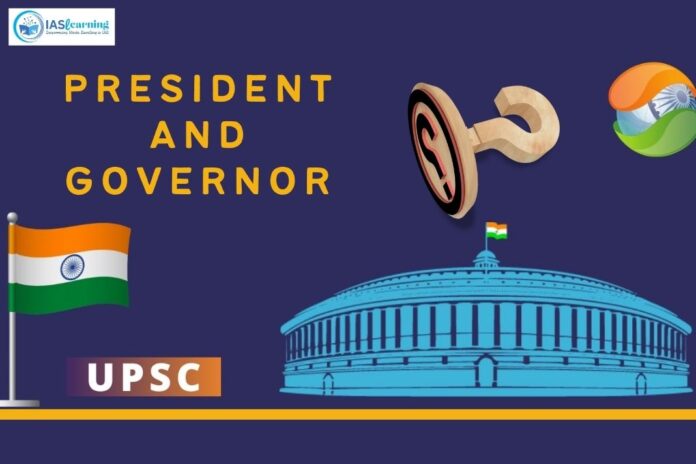President And Governor
Articles 52 to Article 78 in Part V of the Constitution:
- These articles deal with the Union Executive in the Indian Constitution.
President as the Head of the Indian State:
- The President holds a significant position as the head of the Indian state.
- Described as the first citizen of India, the President serves as a symbol of unity, integrity, and solidarity for the nation.
Election of the President:
- The President is not elected directly by the people but by members of the Electoral College.
Governor as the Chief Executive Head of the State:
- The Governor holds the position of the chief executive head of a state.
- Similar to the President, the Governor is considered a Nominal Executive head or constitutional head.
Dual Role of the Governor:
- The Governor acts as an agent of the Central Government, indicating a dual role in representing both the state and the central authority.
Governor’s Appointment and the Seventh Constitutional Amendment Act of 1956:
- The seventh Constitutional Amendment Act of 1956 allowed for the appointment of the same person as the Governor for two or more states.
- This provision facilitated a more efficient administrative structure by appointing a single individual to oversee multiple states.
Who currently holds the position of the President of India?
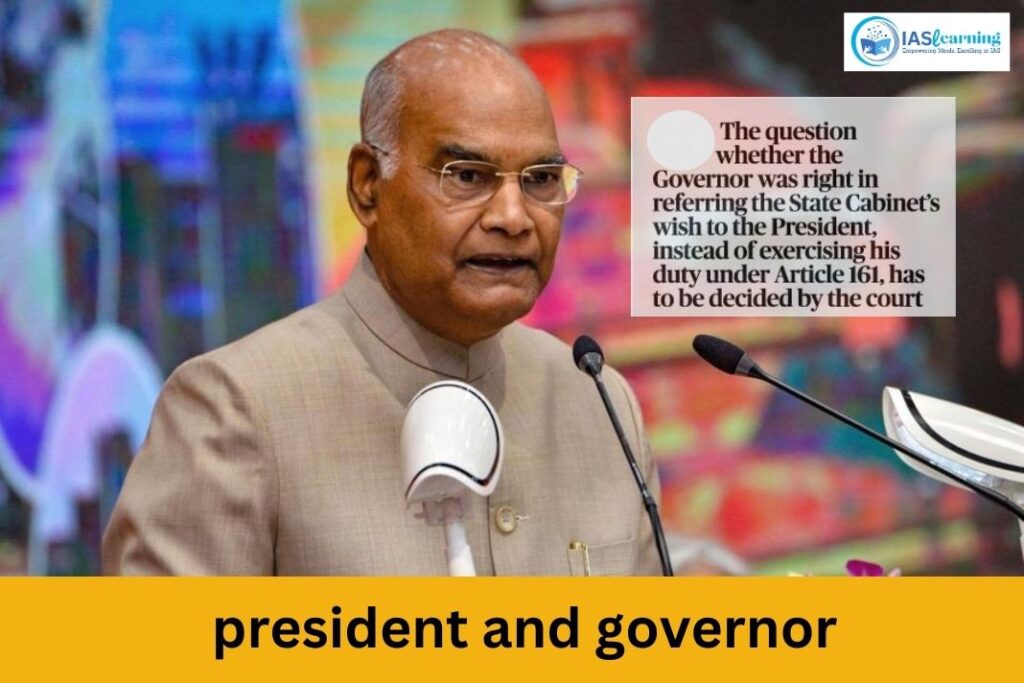
The President serves as the head of the state and is a vital component of the Union Executive, alongside the Prime Minister, Council of Ministers, Vice-President, and Attorney-General of India. Functioning as a symbol of national unity and solidarity, the President is chosen indirectly through an electoral college comprising:
- Elected members from both Houses of Parliament,
- Elected members of the Legislative Assemblies of states,
- Elected members of the Legislative Assembly of the Union Territories of Delhi and Puducherry.
Notably, certain individuals, including nominated members of Parliament and state legislatures, members of state legislative councils, and nominated members from Union Territories of Delhi and Puducherry, do not participate in the presidential election process. Additionally, if an assembly is dissolved, its members lose their eligibility to vote in the presidential election, even if fresh elections for the dissolved assembly are not conducted before the presidential election. The groups of people excluded from participating in the election of the President of India include:
- Nominated members of the Rajya Sabha,
- Nominated members of the state legislative assembly,
- Members of legislative councils (both elected and nominated) in bicameral legislatures,
- Nominated members of the Union Territories of Delhi and Puducherry.
Governor
A Governor is the principal executive head of a state. The provisions regarding the state executive are outlined in Articles 153 to 167 in Part VI of the Constitution. The state executive comprises the Governor, Chief Minister, council of ministers, and the advocate general of the state.
The Governor assumes the role of a titular or constitutional head and serves as the representative of the Centre, as the Union government nominates a Governor for each state. Unlike the President, the Governor is not elected directly by the people or indirectly by a specially constituted electoral college. Instead, the President appoints the Governor through a warrant under their hand and seal. Essentially, the Governor is a nominee of the Central Government.
However, it’s crucial to note that, according to a Supreme Court ruling in 1979, the office of the Governor is not considered an employment under the Central government. It is an independent constitutional office that operates autonomously and is not subject to the control of subordinates to the Central government.
The nomination of a Governor is carried out by the Union, and the appointment is made by the President, following a model similar to the Canadian system of government. A Governor holds office for a term of five years.
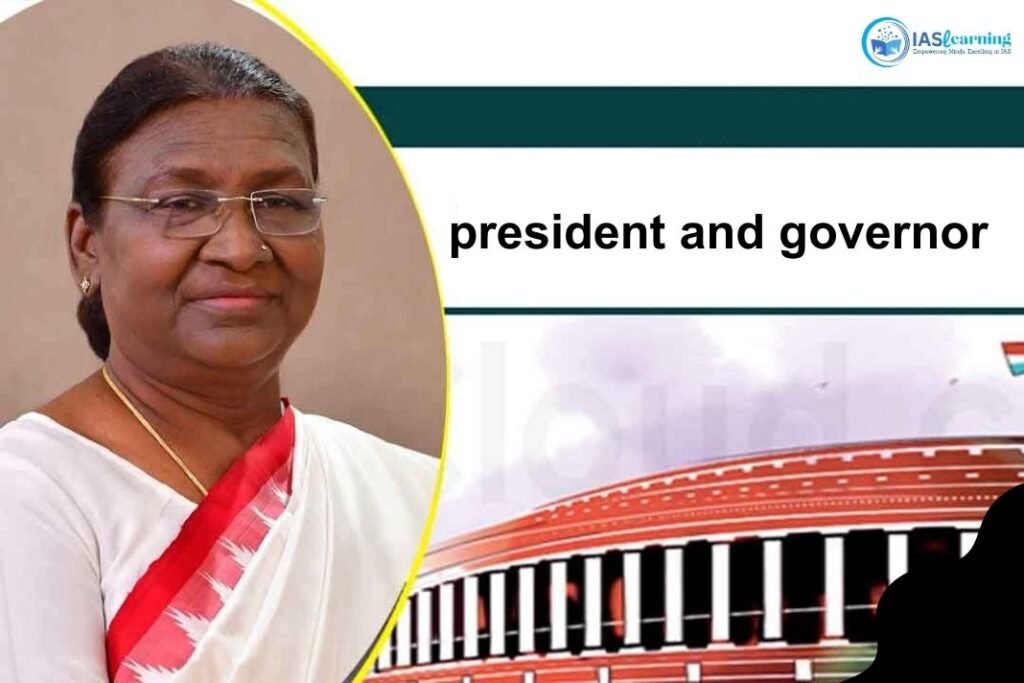
Comparison between President and Governor:
| Issues | President | Governor |
|---|---|---|
| Head | Head of the Country; Head of Government is PM | Head of the State; Head of Government is CM |
| Oath | To protect, preserve, and defend the Constitution | To defend, preserve, and protect the Constitution |
| Executive Powers | All executive powers taken in his name | All executive actions taken in his name |
| Appointment | Indirectly elected by an electoral college | Nominated by the President; representative of the Union |
| Removal | Can be removed by Impeachment | Can be removed by the President any time |
| Grounds of Removing | On the grounds of violating the Constitution | No specific grounds mentioned |
| Advice of Council of Ministers | Binding (42nd amendment; return once – 44th amendment) | Binding, save for exceptional circumstances (various Supreme Court judgments) |
| Money Bill | Cannot be sent for reconsideration; President recommends the bill | Cannot be sent for reconsideration; President recommends the bill |
| Constitution Amendment Bill | Must give assent (24th amendment) | Governor plays no role in Constitution Amendment Bill |
| Clemency Power | Liable to pardon death sentence and court martial sentences | Cannot pardon death sentence; no role in military matters |
| House Sends Bill Back | Not bound to give assent | No role regarding this |
Ordinary Bills:
President:
- May give assent to the bill, making it an act.
- May withhold assent, causing the bill to end without becoming an act.
- May return the bill for reconsideration by the houses. If passed again, with or without amendments, the President must give assent. This represents a “Suspensive Veto.”
Governor:
- May give assent to the bill, making it an act.
- May withhold assent, leading the bill to end without becoming an act.
- May return the bill for reconsideration by the House or Houses. If passed again, with or without amendments, the Governor must give assent. This is a “Suspensive Veto.”
- May reserve the bill for the consideration of the President.
Money Bills:
President:
- May give assent to the bill, making it an act.
- May withhold assent, causing the bill to end without becoming an act.
- No provision for returning money bills for reconsideration.
Governor:
- May give assent to the bill, making it an act.
- May withhold assent, leading the bill to end without becoming an act.
- May reserve the bill for the consideration of the President.
This summary outlines the powers of both the President and Governors in relation to ordinary bills and money bills, highlighting their authority to give assent, withhold assent, or return bills for reconsideration. It also notes the special provision for reserving money bills for the consideration of the President.
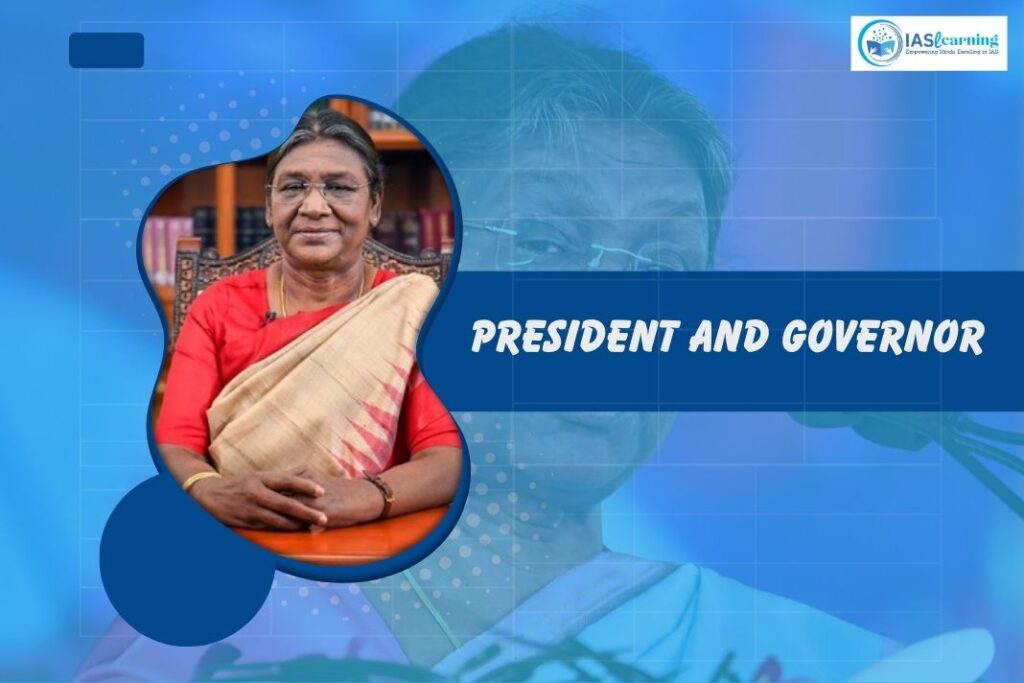
Constitutional Discretion:
President:
- Does not have any power of constitutional discretion.
Governor:
- Can decide independently, without the advice of the Council of Ministers, when reserving a bill for the consideration of the President.
- Can act at their own discretion when recommending President’s rule in the state.
- Exercises discretion when holding an additional charge as Union Territory administrator.
- May take independent actions, at their discretion, when seeking information from the Chief Minister regarding legislative and administrative affairs.
Situational Discretion:
President:
- No party having a clear majority or no successor to the Prime Minister in case of death in office.
Governor:
- Can act at situational discretion in the following cases:
- Appointing a Chief Minister when no party has a clear majority in elections or if the incumbent dies in office.
- Dismissing the Council of Ministers if they fail to prove confidence in the state legislative assembly.
- Dissolving the state legislative assembly when it loses its majority.
This summary highlights the instances where both the President and Governors have discretionary powers, either constitutionally or in specific situations. It emphasizes their ability to make independent decisions in certain scenarios, contributing to the flexibility of their roles.
Some additional important differences between the powers and functions of the President and Governors:
Representation of Anglo-Indian Community:
- In the Lok Sabha (House of the People), the President has the authority to nominate two members of the Anglo-Indian community.
- At the state level, Governors have the power to nominate one member of the Anglo-Indian community to the State Legislature.
Nomination Powers in the Upper House:
- In the Rajya Sabha (Council of States), the President is responsible for nominating 12 members.
- Governors, on the other hand, nominate 1/6th of the members in the State Legislative Council in states where a bicameral legislature exists.
Declaration of War or Peace:
- The President of India holds the authority to declare war or make peace, reflecting a significant power in matters of national security and foreign relations.
Pardon Powers under Martial Law:
- The President can exercise the power of pardon for individuals subjected to punishment under Martial Law, providing a specific scope for the exercise of this authority.
Conclusion
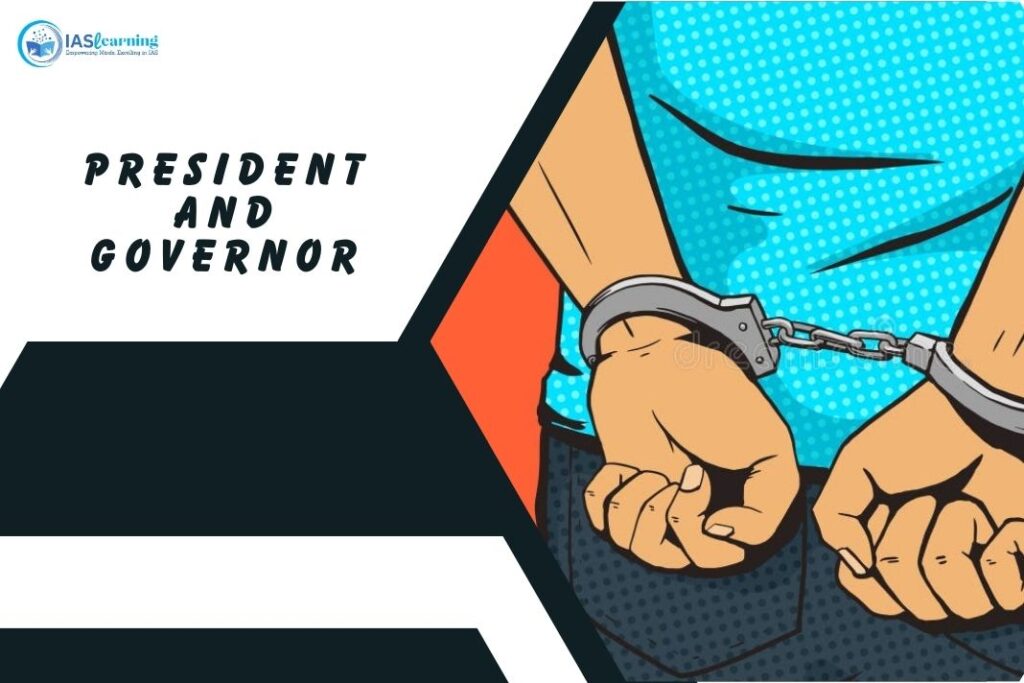
President of India:
- Symbolic Head of the Nation:
- The President serves as the ceremonial head of the country, embodying the unity, integrity, and sovereignty of the nation. This symbolic role is significant in fostering a sense of national identity.
- Executive Powers:
- As part of the Union Executive, the President holds certain executive powers, although many of these are exercised on the advice of the Council of Ministers led by the Prime Minister.
- Election Process:
- The President is elected indirectly by an Electoral College, which includes elected members of both houses of Parliament, state legislative assemblies, and the legislative assemblies of Union Territories.
- Constitutional Duties:
- The President performs various constitutional duties, such as addressing the nation on important occasions, appointing the Prime Minister, and approving bills passed by the Parliament.
Governor:
- Constitutional Head of State:
- The Governor functions as the constitutional head of a state and represents the President at the state level. While the Governor’s role is largely ceremonial, they play a crucial part in the state’s administration.
- Agent of the Centre:
- Nominated by the Union Government, the Governor acts as the agent of the central government in the state. This role ensures coordination between the central and state administrations.
- State Legislative Role:
- The Governor has specific responsibilities in relation to the state legislative process, such as summoning and proroguing sessions, addressing the state legislature, and giving assent to bills.
- Emergency Powers:
- In times of constitutional crises or breakdown of governance, the Governor has the authority to recommend President’s Rule, leading to central intervention in the state’s administration.
- Nomination of Members:
- In states with a bicameral legislature, the Governor nominates members to the State Legislative Council, contributing to the composition of the upper house.
By understanding these distinctions, it becomes clear that while the President holds a more overarching national role, the Governor’s position is intricately linked to state-level governance and the implementation of policies and decisions made at the central level.

